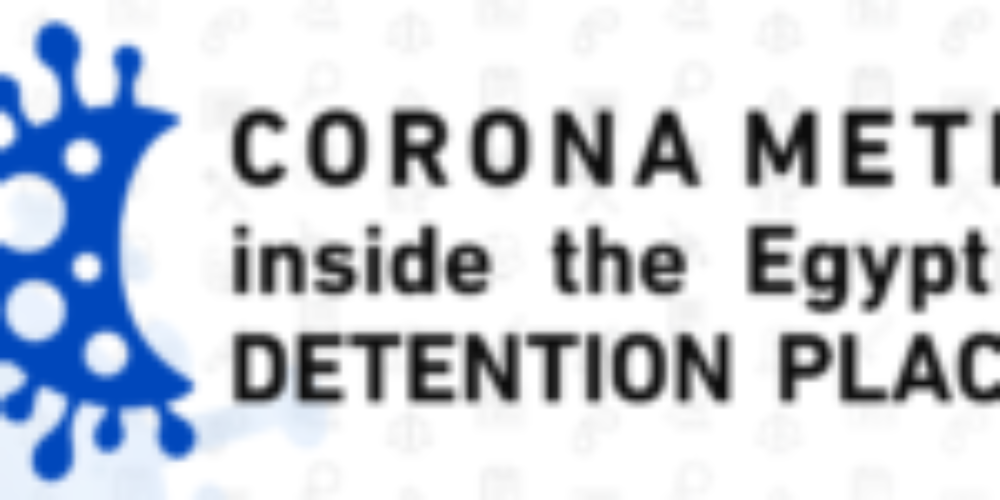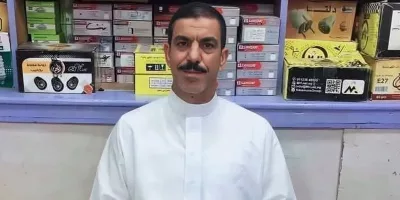The Committee for Justice (CFJ) has documented the rise in the number of confirmed and suspected cases of coronavirus (COVID-19) among detainees, police officers and workers in detention facilities in Egypt to a total of 312 cases, 212 of whom are suspected and 100 are confirmed cases in 48 detention facilities in 13 governorates, according to the Corona Meter live monitor launched by CFJ recently. The monitor is updated on a weekly basis according to the information received.
In the past week, CFJ has not recorded any coronavirus-related deaths among detainees and workers in detention facilities. Therefore, the total deaths recorded so far are 15 people in 10 detention places in 4 governorates.
Of the 279 confirmed and suspected infections among detainees, according to CFJ data, the interior ministry has only conducted 29 PCR tests and 42 blood tests for detainees based on health ministry protocols, while medical tests were not performed for 54 detainees, and medical measures for 154 detainees remain unknown to CFJ.
Meanwhile, of the 279 injured and suspected detainees, the ministry of interior has implemented isolation measures – most of which do not conform to internationally recognized health standards – for only 126 detainees, while those measures have not been taken for 135 others, which threatens the lives of those who come into contact with them. The isolation procedures for 18 others remain unknown for CFJ.
In conjunction with the practice of systematic blackout by the ministry in its response to the crisis of the spread of the virus in prisons and places of detention, a number of departments in several prisons and places of detention (including national security officers and the Criminal Investigation Department) have threatened detainees to resort to repressive practices against them such as confinement in disciplinary rooms and alienation – which is the transfer of a detainee to a poorly managed place of detention far from his place of residence- which represent a form of punishment for the detainees and their families, which cause severe suffering, in the event that information is provided to human rights organizations, or the media about the reality of conditions inside detention facilities, the extent of the spread of the coronavirus inside them, and the measures taken by prison authorities.
Additionally, the administrations of many detention facilities, especially police stations – which reported the largest number of cases – continue to refuse to transfer sick detainees to hospitals for treatment.
Many detention centres have converted their detention rooms to a place of virus isolation, while those rooms do not have any of the health standards necessary to take them as places of isolation. Some have even used disciplinary rooms and solitary confinement as places of isolation, turning isolation procedures to a repressive measure, violating more rights of detainees under the pretext of the fight against the virus. This is in addition to the lack of awareness among those in charge of detention facilities, and those held within them, of the procedures to be followed in case of infection, suspicion of infection, and the preventive and protective measures used.
The ministry of interior also continues to refrain from implementing preventive measures to combat the spread of the virus, which has helped increase infection rates in detention facilities, threatening the lives of detainees.
Ahmed Mefreh, director of CFJ, has stressed that attempts to silence voices and obscure the reality of conditions inside prisons and detention facilities are practices that the Egyptian ministry of interior has become accustomed to, as a method to facilitate impunity for perpetrators of human rights violations. It also shows the lack of
responsibility among leaders of the ministry of interior in their handling of the crisis.
CFJ warns against the policy of ‘herd immunity’ used by Egyptian authorities in dealing with the spread of infection inside prisons and detention facilities in complete disregard for the of the fact that detainees are among the most vulnerable and at-risk groups, given that the infrastructure of prisons and detention centres in Egypt is a fertile environment for the spread of diseases. This comes at a time when authorities were obligated to fulfil their duty to the right to health, and to exert efforts to put an end to the existing problems that claim the lives of detainees for various reasons, chief among them are overcrowding and deprivation of health care.
CFJ demands the Egyptian ministry of interior to adhere to the measures of protection and prevention in the face of the spread of the virus, implement awareness-raising measures, and provide information on health preventive measures and the healthy way of life for detainees and workers in detention facilities, as well as demand the internal institution to be courageous and transparent in dealing with the crisis, enabling detainees to receive medical care, communicate with their attorneys and families, and provide protection, especially for elderly prisoners and those with chronic diseases who are most at risk.






